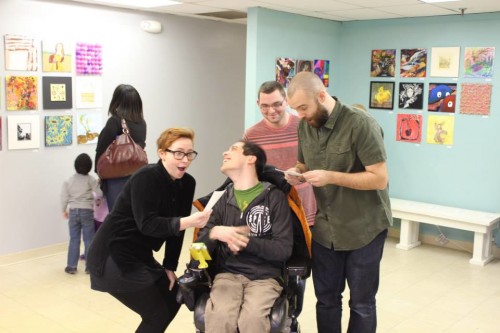The Arts of Life is an organization comprised of people with and without disabilities creating an artistic culture to realize their full potential. Founded in 2000, The Arts of Life was the first program in Chicago to provide employment in the arts for adults with developmental disabilities. The studio serves as both an alternative day program and creative home for its artists.

Tell us a little bit about yourself and what you do. I’m Denise Fisher, the founder and executive director for The Arts of Life. I like to say that I do all the non-creative (aka boring) tasks for the studio, but I’m not sure they really exist. My favorite part of my role is helping young professionals develop and making sure, as an organization, we are always in motion.
How has living in Chicago affected your work? I moved to Chicago specifically to affect my work. Growing up in the Quad Cities, there was only one provider supporting people with intellectual/developmental disabilities, and I knew I didn’t want to work for them. I was hoping a larger city would be more creative in their services, but I didn’t find that to be true.
Who is your ideal business sponsor/partner? I have to use this question to promote Rogue Philanthropy, The Arts of Life’s Philanthropy partner, whose mission is to partner with organizations dedicated to making practical improvements in services for people with intellectual and developmental disabilities.

What kinds of things are influencing your work right now? The current team, their ideas and needs are a huge driving force in my role at the studio. I really want the people that work in our program to feel supported and understand that they shape the growth of our environments.
If you were a drink what drink would you be? HA! I have NO idea. I did forward this to a close friend and to a co-worker. I think it’s interesting what came back. Friend: Belgian beer because it seems like a good straightforward beer, but then will sneak up and kick your ass if you let it. Way stronger then you first think. Co-worker: Whiskey sour because it’s strong, straightforward and reliable.
How did your interest in your work begin? My mother was an aide in a special ed classroom, and I went there on days that my school was closed. That lead to me becoming a trainer for Special Olympics and becoming friends with people who have disabilities. After working at a group home in college, I knew I wanted to support people, but I also wanted the system to change.

What do you want a viewer to walk away with after experiencing your work? Speaking as a community member at The Arts of Life, I want them to see what brings everyone together (the talented creative practice) and not what separates us (our abilities/ disabilities).
What’s your absolute favorite place in the city/the world to be? Outside with my dog. I’m a very introverted person who has created this very exhaustingly collaborative environment, so I really look forward to being outside and without other humans.

What are you reading right now? I just finished The Interestings by Meg Wlitzer. If anyone reading this went to or worked at a camp, it’s about how those relationships become foundations in your life. I really enjoyed it.
Any current or upcoming events that you are involved in that we should know about? Rogue’s launch underground dinner will be the last Saturday in June. Details are to come, but we’d love to have you share it! People can also go to the website to learn more.

What were you like in high school? Almost the exact opposite of who I am today. One word—cheerleader!
Can you share one of the best or worst reactions you have gotten as a result of your work? One of the best pieces of our model is our collective decision making. What this means is that everyone involved in our program has equal decision making power. We meet monthly and discuss a variety of topics and vote on them. When we first opened another provider described us as Survivor and said we “randomly voted people off the island”. I never thought so many professionals would be against giving away their power to the people that matter—our artists. The collective decision making piece seemed so obvious to me, but other people who work in our field were very turned off by the idea. And, unfortunately, some people still are.

